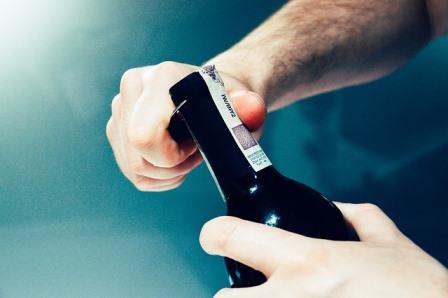- Calls to this hotline are currently being directed to Within Health, Fay or Eating Disorder Solutions
- Representatives are standing by 24/7 to help answer your questions
- All calls are confidential and HIPAA compliant
- There is no obligation or cost to call
- Eating Disorder Hope does not receive any commissions or fees dependent upon which provider you select
- Additional treatment providers are located on our directory or samhsa.gov
Drunkorexia Widespread Among Australian College Students

Contributor: Courtney Howard, B.A., Executive Assistant at Eating Disorder Hope and Addiction Hope
Eating disorders come in many shapes and sizes across the globe. According to a new study, a specific set of disordered behaviors surrounding food and alcohol labeled “drunkorexia” appears to be affecting college students throughout Australia at an alarming rate.
What is Drunkorexia?
Though it has a funny name, there is nothing remotely funny about this condition that involves disordered food behaviors combined with binge drinking.
Individuals with drunkorexia engage in disordered food behaviors, including restriction, purging, and compulsive exercise, to compensate for calories consumed when drinking alcohol. For example, someone might fast for an entire day when he or she is going to a party or club that night and plans to consume alcohol in large quantities.
Similarly, these compensatory behaviors can be used after alcohol consumption. Regardless, there are serious mental and physical health consequences to this dangerous pattern of behaviors.
Study Finds Common Among Australian Students
 A recent study [1] published in June 2016 found that drunkorexia is quite common among Australian university students. The study was led by University of South Australia student Alissa Knight and colleagues who surveyed 136 female students, ages 18 to 25, from 43 different universities throughout Australia. All students who participated had consumed alcohol within the past three months, regularly consuming four or more alcoholic beverages per event. These participants did not fit the diagnostic criteria for any other eating disorder.
A recent study [1] published in June 2016 found that drunkorexia is quite common among Australian university students. The study was led by University of South Australia student Alissa Knight and colleagues who surveyed 136 female students, ages 18 to 25, from 43 different universities throughout Australia. All students who participated had consumed alcohol within the past three months, regularly consuming four or more alcoholic beverages per event. These participants did not fit the diagnostic criteria for any other eating disorder.
Knight, who is studying for her Ph.D., and colleagues found that 57.7 percent of study participants admitted to having engaged in drunkorexic behaviors at least 25 percent of the time throughout the past three months. Only 27.2 percent of the students sampled reported no history of drunkorexic behaviors.
Most participants stated that they engaged in disordered food behaviors before, during, or after drinking alcohol so that they could consume larger quantities of alcohol and not have it affect their weight. Knight notes that while other eating disorders are often about control, drunkorexia instead appears to be directly related to desire for alcohol consumption and perceived thinness.
Dangers of Drunkorexia
 Since the population studied consisted of college students, some people might excuse this behavior as the norm for this age group. They might be “experimenting” with alcohol, or trying to fight off the “freshman fifteen.” The reality is that drunkorexic behaviors must be recognized as a serious condition with potentially fatal consequences.
Since the population studied consisted of college students, some people might excuse this behavior as the norm for this age group. They might be “experimenting” with alcohol, or trying to fight off the “freshman fifteen.” The reality is that drunkorexic behaviors must be recognized as a serious condition with potentially fatal consequences.
Some of the study participants stated they like drinking on an empty stomach because it makes them intoxicated faster. This is because there is no food in their bodies to absorb the alcohol, so it goes straight to their bloodstream. For this reason, Knight points out, not having anything in your stomach increases alcohol toxicity.
Binge drinking while engaging in drunkorexic behaviors increases an individual’s likelihood of alcohol poisoning, cirrhosis of the liver, brain damage, and other health risks.
Additionally, one of the behaviors often implemented by individuals with drunkorexia is excessive exercise. When someone has been binge drinking, waking up early the next day to spend hours at the gym without consuming food can lead to extreme dehydration and exhaustion. This is true of anyone engaging in compulsive exercise, but even more so when large quantities of alcohol have recently been consumed.
When to Know It’s Drunkorexia
 You might have opted for the bottomless mimosas at brunch last Sunday while skipping the pancakes. Or you might have left happy hour with coworkers a few pints deep and forgotten to order that burger you had your eye on. If this happens occasionally, this is likely not drunkorexia. You will know you have a problem if you purposefully restrict, purge, or exercise away calories with the intention of being able to consume more alcohol in the future or to make up for calories previously consumed through alcohol.
You might have opted for the bottomless mimosas at brunch last Sunday while skipping the pancakes. Or you might have left happy hour with coworkers a few pints deep and forgotten to order that burger you had your eye on. If this happens occasionally, this is likely not drunkorexia. You will know you have a problem if you purposefully restrict, purge, or exercise away calories with the intention of being able to consume more alcohol in the future or to make up for calories previously consumed through alcohol.
That being said, whenever you consume alcohol, it is recommended that you do so mindfully and with food in your system.
If you fear you might be engaging in drunkorexic behaviors, it is vital that you reach out for help. Though there is little research on drunkorexia since it is a newly recognized condition within the eating disorder community, the long-term effects of eating disorder behaviors and binge drinking independently are well established and can pose a serious risk to your health.
Community Discussion – Share your thoughts here!
How do you think we can help raise awareness for drunkorexia on college campuses?
 About the Author: Courtney Howard is the Executive Assistant for Eating Disorder Hope and Addiction Hope. She graduated summa cum laude with a B.A. from San Diego State University, holds a paralegal certificate in Family Law, and is a Certified Domestic Violence Advocate. After obtaining her certification as a life coach, Courtney launched Lionheart Eating Disorder Recovery Coaching in 2015 and continues to be a passionate advocate for awareness and recovery.
About the Author: Courtney Howard is the Executive Assistant for Eating Disorder Hope and Addiction Hope. She graduated summa cum laude with a B.A. from San Diego State University, holds a paralegal certificate in Family Law, and is a Certified Domestic Violence Advocate. After obtaining her certification as a life coach, Courtney launched Lionheart Eating Disorder Recovery Coaching in 2015 and continues to be a passionate advocate for awareness and recovery.
References:
[1]: Knight, A., Castelnuovo, G., Pietrabissa, G., Manzoni, G. M. and Simpson, S. (2016). Drunkorexia: An Empirical Investigation among Australian Female University Students. Australian Psychologist. doi: 10.1111/ap.12212The opinions and views of our guest contributors are shared to provide a broad perspective of eating disorders. These are not necessarily the views of Eating Disorder Hope, but an effort to offer discussion of various issues by different concerned individuals.
We at Eating Disorder Hope understand that eating disorders result from a combination of environmental and genetic factors. If you or a loved one are suffering from an eating disorder, please know that there is hope for you, and seek immediate professional help.
Last Updated & Reviewed By: Jacquelyn Ekern, MS, LPC on July 25, 2016
Published on EatingDisorderHope.com

The EatingDisorderHope.com editorial team comprises experienced writers, editors, and medical reviewers specializing in eating disorders, treatment, and mental and behavioral health.

